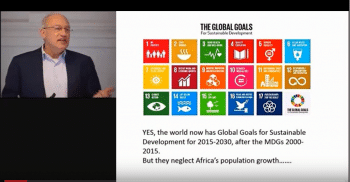
Policy highlights:
- Africa has a very young population, high fertility rates and a growing life expectancy. Despite high, but declining, fertility rates, by 2100 Africa may house 3.4 or even 4 billion people. This video sends a cautionary message to development academics, policy-makers and practitioners. Population growth should be seen as the main challenge for the coming years, but yet it is neglected in the Sustainable Development Goals (SDGs).
- Population growth is now combined with rapid urbanization. In future, this may level out from fertility rates declining faster than expected, changing migration patterns or migration out of Africa, or disasters like disease or war. However, the assumption now is that by 2100, 70% of the African population will be in urban areas. Dietz explains how growth in urban areas will create a (further) demand explosion for shelter, food and services. Such demand is a strain to natural resources and increases the risk of conflict — at the expense of nature, biodiversity and climate stability.
- These challenges are an important issue in terms of migration aspirations. Mobility, not stability, has been the norm in Africa. If Africa cannot manage the population challenge, youth may grow impatient and leave en masse. Increased incomes now allow for more out-migration from countries, which, according to Oxford migration specialists, is only met by in-migration numbers when a certain level of average income (€5000 per capita) is reached.
- Predictions on a global scale include Africa looking more and more towards the East (China), which will make use of cheap and easy labour. Africa may become a battleground for competing blocks. Growth of metropoles combined with marginalization and conflict in the peripheries could result in some regions being seen as “l’afrique util” (useful Africa) and some becoming “l’afrique inutile” (useless Africa). Explosive situations will be created, potentially leading to revolution and/or out-migration. Egypt, with its high import rate and vulnerability to climate change, is a likely first candidate for an explosive situation.
- To achieve the SDGs, policymakers should always consider the far-reaching cross-sectional influence of population growth in Africa, which has consequences for security, food production, climate change and the achievement of the SDGs.










